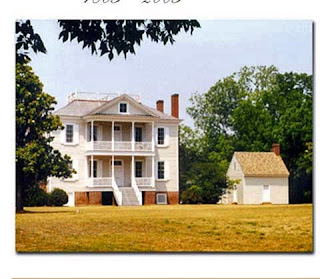Hope Plantation
While visiting Edenton, you may wish to add a short side trip to Hope Plantation. As summarized by the Association’s website:
“Welcome to Historic Hope Plantation, restored home of former North Carolina Governor David Stone (1770-1818). Located four miles west of Windsor, NC, the plantation complex offers unique insights into the late 18th- and 19th-century rural life in eastern North Carolina and the South.

The centerpiece of the plantation is the c. 1803 Hope Mansion, (right) Governor Stone’s stunning example of an academic architectural combination of Federal and Georgian architecture. Restored and opened to the public since 1972, the mansion is meticulously furnished with reproductions and an extensive collection of original period pieces. The 1763 King-Bazemore House represents a fine example of vernacular architecture. It is one of the few remaining examples in North Carolina of mid-eighteenth century “hall and parlor” design. The home has been restored and furnished based on the 1778 inventory of owner, William King.
Both homes are on the National Register of Historic Places and are administered by the Historic Hope Foundation, Inc., a non-profit organization dedicated to preserving and interpreting the history of Hope Plantation and managed by a paid staff and board of directors. The site is open to the publicand guided tours are offered daily.”
Contact the Hope Plantation Foundation at: (252) 794-3140. The site is at 32 Hope House Road, Windsor, NC 27983.
Somerset Place

While visiting Edenton, there is a unique opportunity to visit and learn about life in the days of large plantations. Several Edentonians were instrumental in acquiring, in the late 1700s, former swampland and transforming it into one of the largest (around 100,000 acres) plantations in North Carolina. Just a short drive from Edenton, visiting Somerset Place will expand your understanding of life on a large plantation, from the perspective of the enslaved laborers as well as the owners. It is located at 2572 Lake Shore Road near Creswell, NC 27928.
Somerset Place is operated by the Somerset Place State Historic Site. Check out their website for operating hours and to learn more.
As the North Carolina website reports:
“Somerset Place is a representative state historic site offering a comprehensive and realistic view of 19th-century life on a large North Carolina plantation. Originally, this unusual plantation included more than 100,000 densely wooded, mainly swampy acres bordering the five-by-eight mile Lake Phelps, in present-day Washington County. During its 80 years as an active plantation (1785-1865), hundreds of acres were converted into high yielding fields of rice, corn, oats, wheat, beans, peas, and flax; sophisticated sawmills turned out thousands of feet of lumber. By 1865, Somerset Place was one of the upper South’s largest plantations.”
Newbold-White House
From its location on the Perquimans River, the Newbold-White House, a Colonial Quaker homestead, tells the story of the Abraham and Judith Sanders family. Dating to 1730, the house is the oldest house in the state open to the public and is listed in the National Register of Historic Places. The house is authentically restored and features period furnishings, fireplaces, and a winding corner staircase.
English settlers occupied Perquimans County shortly after North Carolina became a colony in 1663. The first owner of the property, Joseph Scott, may have come to North Carolina in the first wave of European settlement after the issuance of the 1663 Carolina proprietary charter. Of his origins nothing is known, but it is likely he was of English descent. He acquired land on the Perquimans River, apparently patenting 640 acres south of the river in 1663. Abraham Sanders purchased the property in 1726, then known as The Vineyard. He built a brick house in 1730 on the Perquimans River that still stands today. The Sanders riverside plantation was a diverse agricultural operation that included corn, cotton, wheat, flax, indigo, tobacco, and rice. Sanders also produced wood products such as barrels and shingles or shakes for roofs. His Quaker beliefs limited involvement in politics, but he was active in matters of the Perquimans Meeting of the Society of Friends.
Periauger’s home is the Newbold-White House off of Harvey Point Road in Hertford. During the summer months, however, it is often docked at the town dock in Hertford. Signs at both locations tell where the vessel is located. Sometimes, Periauger takes field trips to nautical or historical events of interest.
The Periauger Project mission, in part, is to spread interest in and education about early 18th century maritime life in North Carolina. This web site, and its companion CD, are products of the Perquimans County Restoration Association and its many volunteers. Though the material is owned by the PCRA, it is offered free of charge to educational professionals and students. It may be copied and distributed provided it is not altered and no charge is made.
You can visit the Newbold-White House website here.

